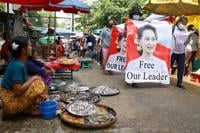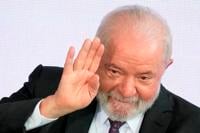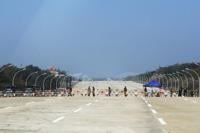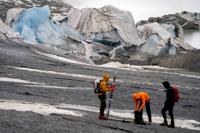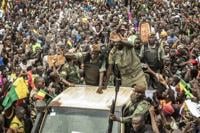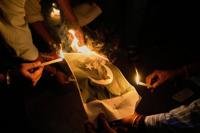UNITED NATIONS (AP) — The independent U.N. special investigator on Myanmar warned Tuesday that the country’s military rulers plan to seek legitimacy by orchestrating a “sham” election this year and urged all countries to reject the illegal and “farcical" vote.
Tom Andrews also called for nations that support human rights and democracy to recognize the underground umbrella organization for opponents of military rule as the legitimate representative of Myanmar's people.
He said in a report to the Human Rights Council released on the eve of the second anniversary of the ouster of Aung San Suu Kyi’s elected government that according to the constitution drafted by the military in 2008, its coup on Feb. 1, 2021, “was illegal and its claim as Myanmar’s government is illegitimate.”
U.N. member nations, Andrews said, “have an important responsibility and role to play in determining whether Myanmar’s military junta will succeed in achieving its goal of being accepted as legitimate and gaining control of a nation in revolt.”
“You cannot have a free and fair election when the opposition is arrested, detained, tortured, and executed,” journalists are prohibited from doing their job, and it is a crime to criticize the military, Andrews said at a news conference.
He noted that most of the international community has refused to accept the military’s claim to be the legitimate government of Myanmar. A small minority, including China, Russia, India, Belaurs, Saudi Arabia and Sri Lanka, have taken actions tantamount to recognition such as presenting diplomatic credentials to the junta leaders and strengthening military and economic relations, he said.
Andrews called for recognition and support for the ��ɫtv Unity Government, the main underground group coordinating resistance to the military. It was established by elected legislators who were barred from taking their seats when the military seized power.
Andrews said he is encouraged by the increasing engagement of the United States, the European Union and Canada with the ��ɫtv Unity Government.
Presenting the report at a news conference, Andrews called Myanmar's situation “the forgotten war” and accused the international community of failing to address the crisis along with “the junta’s systematic crimes against humanity and war crimes.”
Since the military came to power, he said, at least 2,900 people and probably many more have died, 17,500 people are political prisoners and at least 38,000 homes, clinics and schools have been burned to the ground. In addition, 1.1 million people have been displaced, more than 4 million children don’t have access to formal education, and 17.6 million people are expected to need humanitarian aid in 2023, up from 1 million before the coup, he said.
Andrews, a former U.S. congressman who has appointments at the Yale Law School and Harvard’s Asia Center, said a new coordinated international response to the crisis in Myanmar is imperative.
The army's ouster of Suu Kyi's elected government was met with widespread public protests that security forces suppressed with lethal force. The futility of nonviolent protest drove opponents to armed resistance, which some U.N. experts and others have characterized as civil war.
According to Andrews' report to the U.N. Human Rights Council, in the 22 months from the coup through Dec. 31, there were approximately 10,000 attacks or armed clashes between the military and anti-junta, ethnic resistance forces, and other groups.
Andrews urged all members of the Association of Southeast Asian Nations to distance themselves from the junta, condemn its actions, and support enforcement of international sanctions. While Indonesia, Malaysia, Singapore, the Philippines and Brunei have reduced diplomatic engagement and rejected its claims of legitimacy, Cambodia, Laos, Thailand and Vietnam have engaged with the military, though Vietnam and Cambodia have said this doesn’t equate to recognition.
Myanmar is a member of ASEAN and its military leader, Gen. Min Aung Hlaing, agreed to the organization's five-point plan in April 2021 calling for an immediate cessation of violence, a dialogue among all concerned parties mediated by an ASEAN special envoy, but the junta has made little effort to implement it.
Andrews said the military’s hold on the country “is weakening,” saying that his investigation has found that international sanctions have made it difficult for the junta to move and access funds to keep its operations going. But “the problem is that the sanctions are not coordinated,” he said.


